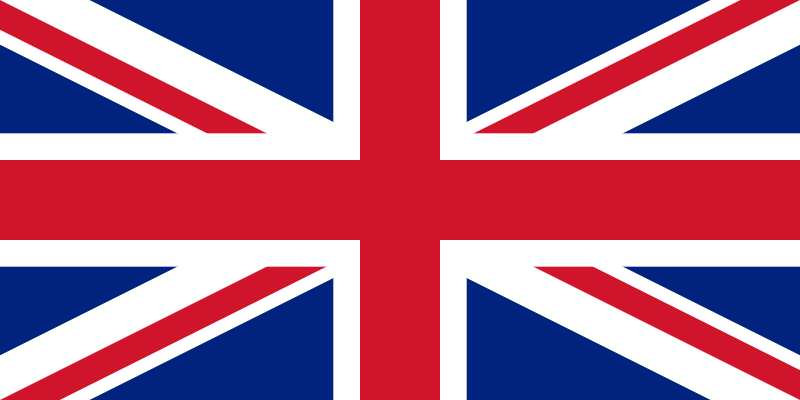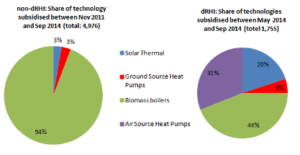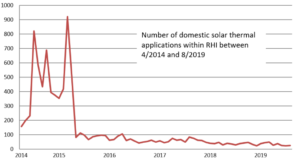Great Britain: Domestic Renewable Heat Incentives with Extensive Rules
April 23, 2014
The domestic Renewable Heating Incentive (dRHI) for England, Wales and Scotland has been launched on 9 April 2014. For solar thermal, the dRHI will pay the end-user tariff at a rate of 0.192 Pound Sterling (GBP)/kWh for 7 years. The existing non-domestic RHI scheme continues at a new rate adjusted for inflation of 0.094 GBP/kWh for 20 years. The dRHI applies to biomass boilers & stoves, ground-source & air-source heat pumps heating and solar thermal DHW for single homes. The subsidy is for properties capable of getting a domestic Energy Performance Certificate (EPC) which confirms the property is a domestic dwelling. The recipient of the subsidy is the owner of the heating system. So this can be the person owning and living in the home, a private landlord or a registered social landlord. In general it is not applicable to a new home unless this has been self-built. Other requirements are that the property should also have a Green Deal Assessment (GDA) and where the GDA recommends installing loft and cavity wall insulation, these must first be fitted before applying for the dRHI. New self-built house can be exempt from the GDA requirement, as these will be assumed to have adequate building insulation. There are initial costs to the user to first obtain the EPC and GDA. (Find more information in the database of incentive programmes.)
Many rules to follow
The equipment has to be fitted by an installer certified under the Microgeneration Certification Scheme (MCS) who is required to follow the methods shown in the MIS 3001 document ‘Requirements for Contractors’ for solar thermal. This in turn requires a solar thermal energy performance calculation to be presented to the end-user according to document MCS 024 ‘Solar Domestic Hot Water Energy Calculation’ which provides the ‘deemed’ basis for the total annual energy eligible for the dRHI tariff. The calculation is based on the older Appendix H of the Standard Assessment Procedure (SAP) 2012 which only calculates for simple system layouts using climate assumptions based on 21 UK regions. In order to assist MCS installers in calculating the annual energy output kWh/year, a calculator spreadsheet has also been released called the Thermal Solar Performance Energy Calculator (TSPEC).
For systems layouts outside the scope of the MCS 024/SAP methods, a manufacturer may apply for their branded equipment to be entered via special Appendix Q database entry for an extra fee. Under the dRHI, no metering will be required on solar primary systems, but metering may be required on other technologies that solar domestic hot water is integrated with.
The MIS 3001 document also requires many fixing and weatherproofing components to have been tested to published standards so as to meet UK building regulations. In turn this refers to MCS 012 ‘Product Certification Scheme Requirements: Pitched Roof Installation Kits’ that applies to both PV modules and solar thermal except where fitted to flat roofs, façades and to frames on the ground.
No support for solar space heating
The solar thermal dRHI will not be available to systems that assist any heating load other than domestic hot water. It is the only technology under the dRHI not eligible to support space heating and no applications of any technology can support swimming pool heating. Also only liquid filled collectors are eligible and non that co-generate with electricity. The key components of the equipment have to be chosen from a Product Eligibility List (PEL) held by the scheme administrator OFGEM. The PEL contains only solar thermal systems supplied from the MCS and Solar Keymark and then filters them into ineligible and eligible products according to European standards and if they are described only as flat plate or evacuated tube. The specific standards referred to for solar thermal systems are EN 12975-1:2006+A1:2010, EN 12975-2:2006, EN ISO 9806:2013, EN 12976-1:2006 and EN 12976-2:2006. This is quite confusing as these are a mix of collector and system test standards, yet there is no mention of the EN 12977 series.
First scheme of its kind in the world
The UK Energy and Climate Change Minister, Greg Barker announced that for the dRHI “This is the first scheme of its kind in the world – showing yet again that the UK is leading the way in the clean energy sector.” Several other trade organisations were reporting an initial positive reaction to the long-awaited launch but the solar thermal industry now has reservations. Martyn Bridges, Director of Marketing and Technical Support at Worcester Bosch Group commented that “It’s tough for installers to get themselves eligible for MCS, Green Deal etc, but it is also expensive, complicated, time consuming and frustrating for manufacturers getting solar products tested for compliance under MCS012. MCS now lists an extensive list of additional requirements over and above what is already a harmonised European standard”.
Call to openly accept alternative methods
Patrick Davies, Technical Director of CoolSky explained that “in order for the Renewables and Solar Thermal Sector in the UK to thrive, the legislation needs to more openly accept alternative methods for installers / installation companies to show they are competent to undertake the installations. A number of competent person schemes are now accredited under EN 45011 for the installation of renewable energy technologies. Installers who accredited under these schemes should be recognised under the RHI – instead of the current situation where unless everything can be shown to be equivalent to MCS then nothing appears to be recognised. An open, free and competitive market for the certification and accreditation of competent installers and installation companies is needed in the UK to encourage new installers into this sector and for the sector to grow”.
More information:


